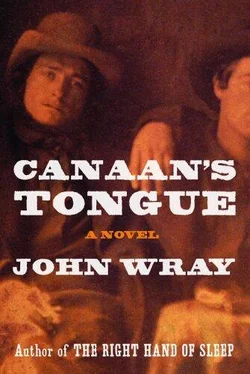John Wray
Canaan's Tongue
He appears to have been a most dexterous and consummate villain, this “Redeemer”. . The stealing of horses in one State, and the selling of them in another, was but a small portion of [his gang’s] business; the most lucrative was the enticing of slaves to run away from their masters, that they might sell them in another quarter.
This was arranged as follows; they would tell a negro that if he would run away from his master, and allow them to sell him, he should receive a portion of the money paid for him, and that upon his return to them a secondtime they would send him to a free State, where he would be safe.
The poor wretches complied with this request, hoping to obtain money and freedom; they would be sold to another master, and run away again, to their employers; sometimes they would be sold in this manner three or four times, until they had realized three or four thousand dollars by them; but as, after this, there was fear of detection, the usual custom was to get rid of the only witness that could be produced against them, which was the negro himself, by murdering him, and throwing his body into the Mississippi. .
— Life on the Mississippi
THERE IS A HOUSE, Parson says.
There is a river. The house, built of the corpses of historic oaks, leans toward the river as if parched. The grounds stand vacant and abashed. A finger-bowl of bare red clay surrounds the house, which seems more desolate even than the grounds. But there are seven men inside of it, and one woman. They are faithful to the house—; they are beholden to it. They could make their home no other place, as no other place would have them.
They are wanted for blood-crimes in eleven states and their lives are held in forfeit. They are wanted by the Union for the murder of ninety-seven slaves—; they are wanted by the Confederacy for destruction of private property. The War the rest of the nation curses has sheltered them, till now, in its great and ample shadow. They are free and at liberty to take their ease. The War rolls past them on the river, and makes the woods unquiet in the evenings—; no more than that. The War is an entertainment. But now a thing has happened that flushes the War from their thoughts like a sparrow from a thicket.
A body has been found. Virgil Ball has found it. Virgil Ball, the most skittish of them all, the most inquisitive, the most tender. He hovers above the body like a bucket above a well. Three other men are with him. The men look at Virgil, then down at his feet, where the body lies stiff and equitable and naked. They draw closer and squint. It is a particular body, known to them by sight. They are each of them killers and well used to unpleasantness but the sight makes them curiously restless.
A question has begun forming in their minds.
MY LIFE’S NOT WORTH A PIG’S KIDNEY, Virgil says. Everyone knows I murdered the Redeemer, driving a sliver of pier-glass through the back of his neck and stuffing him, with the help of the house-nigger, down the hole of the privy—: everyone knows it, and now another of our gang’s been snuffed.
The three holy horrors beside me know it. They know it because I told them—; I told them because I’m a donkey. And now another of us is killed. Goodman Harvey, a lisper, whom nobody liked much, and I liked less than anybody. They suspect me, of course. How could they not suspect me? The thought sends a tear guttering down my cheek, but I’m not such a fool as to look anybody in the eye. I keep mine fixed on this morning’s cadaver, once a man I knew well, laid out like a catfish at my feet.
The story I mean to tell will be a right cameo of this nation, truer than a daguerreotype, more telling than the Constitution. It’s the story of the Trade, and of my twists and turns inside it—: the crimes that I committed, the blasphemies I abetted, the passions I conceived. I speak as of the past, but I am frying in it still. How the devil, then, to tell it? Frontwards, like a Roman history, or backwards, like a Mandarin scroll? From all sides at once, like the Gospels of the Christ? I’m an educated man, but also something of a ponce. I have ever balked when left to my own counsel.
Ever, that is, except once. Once I did not balk. Best to start there, perhaps—: back at the height of my achievement. Best to start at the beginning of the end.
I might begin it as a rhyme, a scrap of school-yard doggerel—:
Virgil Isaiah Dante Ball
Murdered the Redeemer in the fall.
“The Redeemer” was what we called him, out of devotedness—; but his given name was Thaddeus. Thaddeus Morelle. A plain-faced dumpling of a man, remarkable chiefly in his smallness, like Alexander the Great, or Bonaparte. He was set to eat America like a biscuit. He was set to make princes of us all.
Instead I cut his wind-pipe, and he died.
The War for Southern Liberty had just turned a year and a half—: that fixes the date at October 12, 1862. The house-nigger and I hauled him to the privy (his favorite part of the grounds, in life) and forced his little body, after a brief eulogy, through the square-cut opening in the planks. He fell without fanfare, hit the bottom with a whoomp —: the hole was freshly dug and deep. After the service I sprinkled a bit of quick-lime after him and answered nature’s summons. I took my time about it. Then I went back to the house and brought the rest of the gang together and told them what I’d done.
It was the worst hour of my life. The Redeemer had been our Washington, our Robespierre, our Jenghis Khan. I fully expected to be torn to pieces, wept like a Frenchman and had to pinch my right ear-lobe to keep from dropping in a faint. It took a goodly while to tell it—: I’m a coward at the best of times, and on that occasion I warbled like a goose. To my astonishment the gang heard me out in silence, then went off to the privy, one by one, to pay their last respects. By supper the bucket of quick-lime was empty and I’d moved my carpet-sack up — wonder of wonders! — into the master bedroom. I went to bed that night a reinvented man.
That, however, was then. Today is the twelfth of May, and the Natural Order again prevails—: a cleverer man has slipped into the Redeemer’s britches, easy as you please, and I’m once again the Jack Fetchit to them all. Down, and up, and down again, like the India-rubber ball I am. Such is the tendency of heaven, at least with regards to me—: the occasional blessing followed by a shower of shite.
I now sleep in a narrow cubby under the attic stairs. There is a little port-hole window—; I am not ungrateful for that. And I murdered the Redeemer, that oily-faced, cane-twirling, preening sport of nature, just as I promised that I would.
I’m not ungrateful for that, either.
A QUARTER-HOUR HAS GONE BY. We remain clustered together, my three associates and I, adoring the deceased. The silence is thick enough to poke. I’m desperate to say something — anything at all — but my cowardice keeps me mute. Elsewhere ( everywhere, in fact, in this part of the country) men are shooting at each other from shell-holes and river-beds and fields of winter wheat, debating the future of our Union. I’m here at Geburah, miles from the nearest battle-field, watching a body blanch and stiffen.
When I think of it that way it almost seems a privilege.
The body was called “Goodman Harvey” last night, when it still spoke and strutted—; I’m not sure what to call it now. It was a Mormon by birth, a nigger-runner by accident, and an arse-kisser by profession. I stare down at it enraptured. Its undeniable deadness, chalk-white and utter, reminds me again of the Redeemer. (The Redeemer’s face, as I pushed his eyes shut in the light of the nigger’s lantern, wore the same tender look — as though he’d just been given a present — that poor dead Harvey’s has.) In the honeyed morning light that cleaves to every object Harvey’s features seem settled into an expression of serenity — even of wisdom — that I never knew them to wear in life. Alive he was a fidgeting, sot-brained schemer, and I don’t calculate I’ll miss him. But his dying at this moment, hip-deep into the war, in this rotting house the eight of us are packed into like so many Christmas hams, comes as an advertisement, a calling-card of sorts—: a reminder I could just as well do without. The noose is tightening hourly about this house and not a one of us can forget it.
Читать дальше












